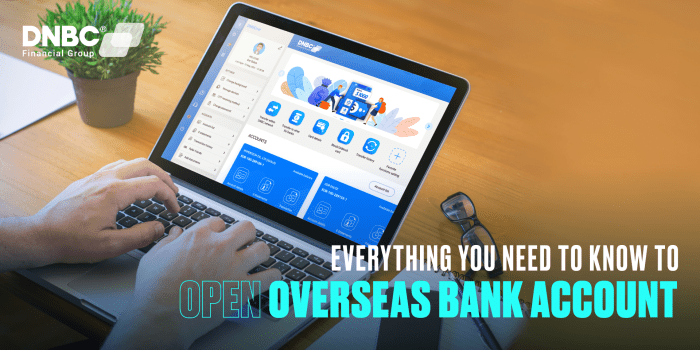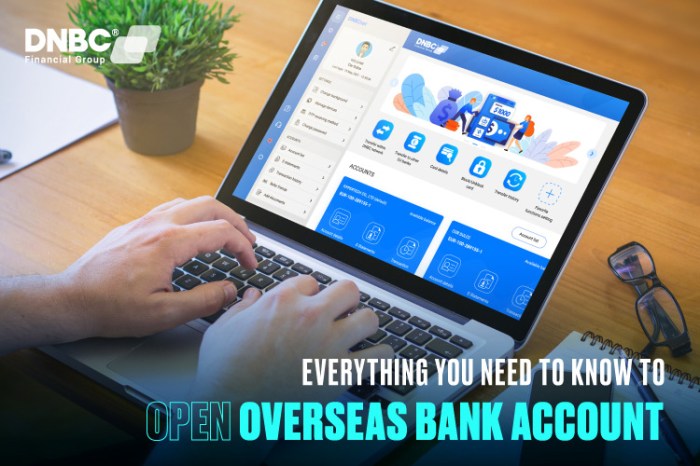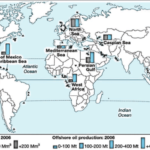How To Open A Bank Account Overseas? This seemingly straightforward question opens a door to a world of international finance, brimming with both exciting opportunities and potential pitfalls. From carefully selecting the right financial institution to navigating complex documentation requirements and understanding the legal implications, opening a bank account in a foreign country requires meticulous planning and a clear understanding of the process.
This guide will walk you through each step, equipping you with the knowledge and strategies needed for a smooth and successful experience.
Whether you’re relocating abroad for work, travel, or investment purposes, establishing an overseas bank account can simplify your financial life significantly. This comprehensive guide covers everything from choosing the right bank and gathering necessary documents to understanding different account types and managing your funds effectively. We’ll also address potential challenges and offer solutions to help you overcome any hurdles you may encounter along the way.
Prepare to navigate the international banking landscape with confidence.
The Account Opening Process: How To Open A Bank Account Overseas

Opening a bank account overseas can seem daunting, but understanding the process beforehand can significantly ease the transition. The methods for opening an account generally fall into two categories: in-person at a branch and online. Both approaches require similar documentation, but the steps and security measures differ.
Opening a Bank Account In Person
Opening a bank account in person provides a more immediate and interactive experience. You’ll directly interact with bank staff who can assist with any questions or complexities during the process. However, this method requires more time and effort in terms of travel and scheduling an appointment.
- Visit a Branch: Locate a branch of your chosen bank and visit during their operating hours. It’s advisable to schedule an appointment beforehand to avoid long wait times, especially during peak periods. Remember to confirm the branch’s specific requirements and necessary documentation.
- Present Required Documentation: You’ll typically need a valid passport or national ID, proof of address (such as a utility bill or rental agreement), and potentially other documents specific to the bank and your circumstances. These might include a visa, employment letter, or tax identification number. Ensure all documents are originals or certified copies.
- Complete Application Forms: The bank will provide application forms requiring personal information, such as your full name, address, date of birth, and employment details. Accuracy is crucial; review the forms carefully before submitting them.
- Initial Deposit: Most banks require an initial deposit to activate the account. The minimum deposit amount varies significantly between banks and countries. Inquire about this requirement before your visit.
- Account Activation: Once the bank verifies your documents and processes your application, your account will be activated. You will receive your account details, including account number and potentially debit card information.
Opening a Bank Account Online
Online account opening offers convenience and flexibility, allowing you to complete the process from anywhere with an internet connection. However, it requires a higher level of digital literacy and trust in online security measures.
- Locate the Online Application: Navigate to the bank’s website and find the section dedicated to opening new accounts. Look for a clear and prominent “Open an Account” or similar button.
- Complete the Online Application Form: The online form will require similar information to the in-person application, including personal details, address, and employment information. Pay close attention to the fields and ensure accuracy.
- Identity Verification: Online banks utilize various security measures for identity verification. This might involve uploading copies of your identification documents, answering security questions, or undergoing video verification with a bank representative. The specific process varies depending on the bank and its security protocols.
- Secure Document Upload: When uploading documents, ensure the files are clear, legible, and in the correct format. Some banks may require specific file sizes or types. Protecting your personal data is crucial; ensure you are using a secure internet connection.
- Initial Deposit (if applicable): Similar to in-person applications, you may need to make an initial deposit to activate your account. The method of deposit will be Artikeld during the application process, and it might involve linking an existing account or using a secure online payment system.
- Account Activation and Access: Upon successful verification and deposit, your account will be activated. You will receive your account details and access credentials via email or through the online banking platform.
Comparison of In-Person and Online Account Opening Methods
Both methods require similar documentation and personal information. However, the in-person method offers immediate feedback and personalized assistance, while the online method prioritizes convenience and speed. The choice depends on individual preferences, technological comfort, and the specific bank’s offerings. Security measures are robust in both methods, but online applications typically involve additional digital verification steps. Consider factors such as time constraints, technological proficiency, and personal comfort levels when choosing your preferred method.
Legal and Tax Implications

Opening a bank account overseas introduces a layer of complexity involving legal and tax considerations. Understanding these implications is crucial to avoid potential penalties and ensure compliance with both your home country’s and the host country’s regulations. Failure to comply can lead to significant financial and legal repercussions, including hefty fines and even criminal charges. This section Artikels key legal and tax aspects to consider.
Tax Implications of Holding Overseas Bank Accounts
The tax implications of holding an overseas bank account vary significantly depending on your country of residence and the specific nature of the funds held in the account. Many countries have regulations regarding the reporting of foreign bank accounts and income generated from foreign sources. Failing to report this information accurately can lead to severe penalties.
- United States: US citizens and residents are required to report all foreign bank accounts with a combined balance exceeding $10,000 at any time during the year using the Foreign Bank Account Report (FBAR). Furthermore, income earned from these accounts must be declared on their annual tax return. Failure to comply with FBAR reporting can result in significant penalties.
- United Kingdom: UK residents are required to declare any foreign income and capital gains on their self-assessment tax returns. This includes interest earned on overseas accounts. The UK also has agreements with other countries to prevent tax evasion through double taxation treaties.
- Canada: Canadian residents are required to report all worldwide income, including income generated from foreign bank accounts, on their tax returns. The specific reporting requirements depend on the type of income and the country where it was earned.
Compliance with Relevant Laws and Regulations, How To Open A Bank Account Overseas
Compliance with relevant laws and regulations is paramount when operating an overseas bank account. This includes adhering to anti-money laundering (AML) and know-your-customer (KYC) regulations. These regulations are designed to prevent financial crimes and ensure the integrity of the global financial system.
- Anti-Money Laundering (AML) Regulations: These regulations require banks to identify and report suspicious activity, such as large cash deposits or unusual transaction patterns. Failure to comply with AML regulations can result in significant fines for both the individual and the bank.
- Know Your Customer (KYC) Regulations: These regulations require banks to verify the identity of their customers to prevent identity theft and other financial crimes. This typically involves providing documentation such as a passport or driver’s license.
- Foreign Account Tax Compliance Act (FATCA) (US): This act requires foreign financial institutions to report information about US account holders to the US Internal Revenue Service (IRS).
Potential Legal Issues
Several legal issues can arise from holding an overseas bank account if proper procedures aren’t followed.
- Tax Evasion: Failing to report foreign income or assets can lead to criminal charges and significant penalties.
- Money Laundering: Using an overseas bank account to conceal the origins of illegally obtained funds is a serious crime with severe consequences.
- Sanctions Violations: Transacting with individuals or entities subject to international sanctions can result in legal repercussions.
- Failure to Comply with Reporting Requirements: Not adhering to reporting requirements, such as FBAR or equivalent regulations in other countries, can result in substantial fines and penalties.
Potential Challenges and Solutions
Opening a bank account overseas can present unique hurdles, even with meticulous preparation. Navigating these challenges effectively requires proactive planning and a clear understanding of potential obstacles. This section Artikels common problems encountered during the account opening process and offers practical solutions to overcome them.
Document Verification Difficulties
Stricter Know Your Customer (KYC) and Anti-Money Laundering (AML) regulations globally necessitate thorough document verification. This often involves submitting certified copies of identification documents, proof of address, and potentially additional documentation depending on the bank and the country. Discrepancies or missing information can significantly delay or even prevent account opening. For example, a passport might not be recognized if it doesn’t meet the bank’s specific requirements regarding validity or photo quality.
Solutions include meticulously reviewing the bank’s requirements beforehand, ensuring all documents are current and accurately reflect your details, and obtaining certified copies from officially recognized sources. Proactive communication with the bank’s international customer support team can also address specific queries and expedite the process.
Language Barriers and Cultural Differences
Communication difficulties can arise due to language barriers and differing cultural norms. Misunderstandings can lead to delays, errors, and frustration. For instance, subtle nuances in phrasing or business etiquette might not be immediately apparent, leading to misinterpretations of instructions or requests. Overcoming these challenges requires employing translation services for official documents and communication with the bank. Engaging a local intermediary or consultant familiar with both the banking system and cultural context can prove invaluable in navigating these complexities.
Using clear and concise language in all communications, and double-checking translations for accuracy, is crucial.
Proof of Address Complications
Providing sufficient proof of address can be a significant hurdle, especially if you are temporarily residing in a foreign country or do not have a long-term rental agreement. Banks may require specific documentation, such as utility bills, rental agreements, or official government-issued documents demonstrating your current address. The unavailability or insufficient age of such documents can delay or block the account opening.
Solutions involve understanding the bank’s specific requirements and proactively gathering alternative documentation, such as a letter from your employer, hotel confirmation, or a sworn affidavit from a known individual confirming your residence. Clearly explaining your situation and providing supplementary evidence can help resolve these issues.
Financial Transaction Restrictions
Some countries impose restrictions on international money transfers or limit the types of accounts available to non-residents. These restrictions can impact the ease and speed of funding your new account. For example, significant delays might occur in transferring funds from your home country due to regulatory compliance checks. Solutions include understanding the relevant regulations in both your home and the target country.
Choosing a bank that specializes in international transactions and clearly understanding their transfer policies and associated fees can mitigate delays and expenses. Exploring alternative transfer methods like SWIFT transfers or using specialized international money transfer services might also be beneficial.
- Problem: Difficulty understanding bank requirements due to language barriers.
- Solution: Utilize professional translation services and seek assistance from a local consultant.
- Problem: Insufficient or inappropriate documentation for verification.
- Solution: Meticulously review requirements, obtain certified copies of all necessary documents, and proactively communicate with the bank.
- Problem: Delays in international fund transfers.
- Solution: Choose a bank with experience in international transactions, understand transfer policies, and consider alternative transfer methods.
- Problem: Difficulties proving address in a foreign country.
- Solution: Gather alternative proof of address documentation, such as a letter from your employer or a sworn affidavit.
Opening a bank account overseas is a significant undertaking, but with careful planning and a methodical approach, it can be a rewarding experience. By understanding the various factors involved—from choosing the right bank and gathering necessary documents to managing your account and navigating potential challenges—you can successfully establish a secure and convenient financial presence abroad. Remember to prioritize security, comply with all relevant laws and regulations, and utilize the resources available to ensure a smooth and successful process.
Your global financial journey starts here.

